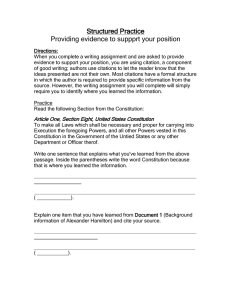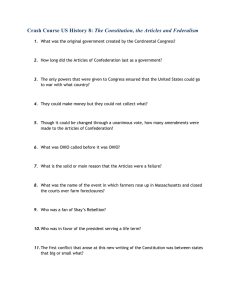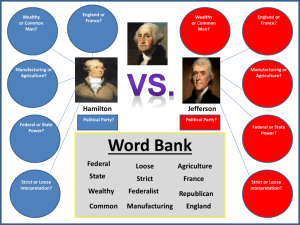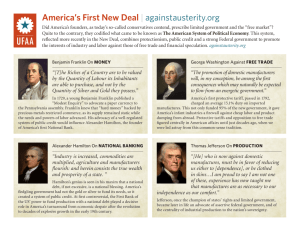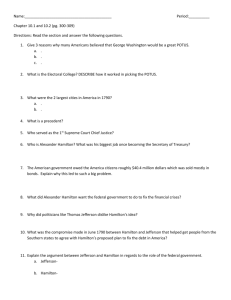American Biography – Alexander Hamilton (1755-1804)
advertisement
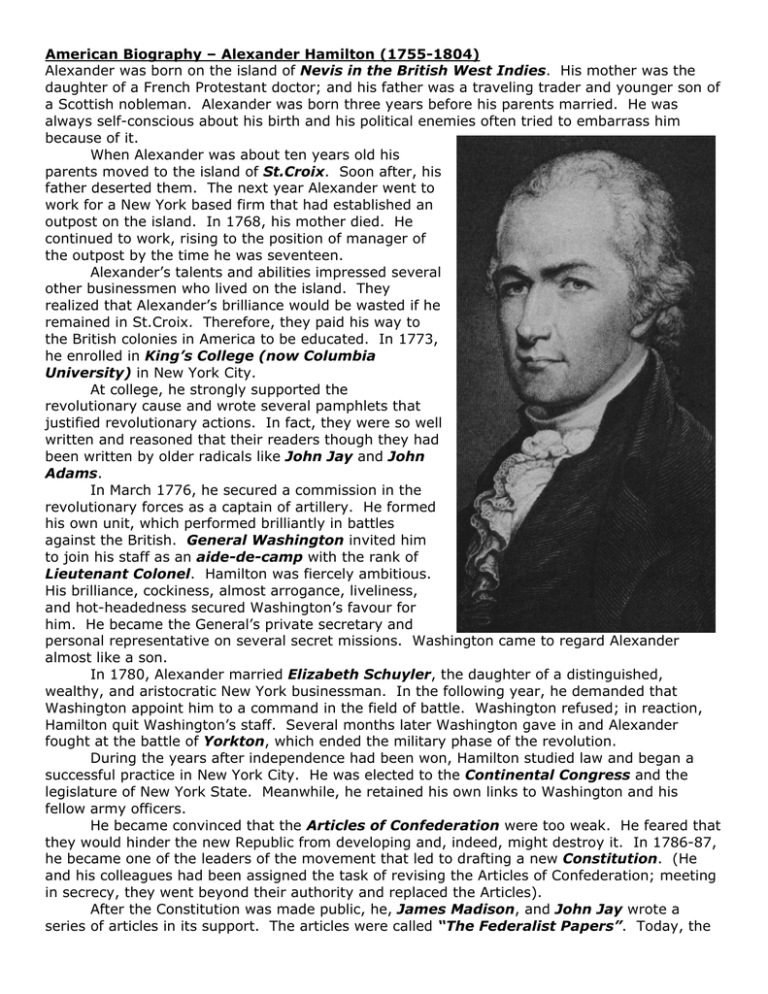
American Biography – Alexander Hamilton (1755-1804) Alexander was born on the island of Nevis in the British West Indies. His mother was the daughter of a French Protestant doctor; and his father was a traveling trader and younger son of a Scottish nobleman. Alexander was born three years before his parents married. He was always self-conscious about his birth and his political enemies often tried to embarrass him because of it. When Alexander was about ten years old his parents moved to the island of St.Croix. Soon after, his father deserted them. The next year Alexander went to work for a New York based firm that had established an outpost on the island. In 1768, his mother died. He continued to work, rising to the position of manager of the outpost by the time he was seventeen. Alexander’s talents and abilities impressed several other businessmen who lived on the island. They realized that Alexander’s brilliance would be wasted if he remained in St.Croix. Therefore, they paid his way to the British colonies in America to be educated. In 1773, he enrolled in King’s College (now Columbia University) in New York City. At college, he strongly supported the revolutionary cause and wrote several pamphlets that justified revolutionary actions. In fact, they were so well written and reasoned that their readers though they had been written by older radicals like John Jay and John Adams. In March 1776, he secured a commission in the revolutionary forces as a captain of artillery. He formed his own unit, which performed brilliantly in battles against the British. General Washington invited him to join his staff as an aide-de-camp with the rank of Lieutenant Colonel. Hamilton was fiercely ambitious. His brilliance, cockiness, almost arrogance, liveliness, and hot-headedness secured Washington’s favour for him. He became the General’s private secretary and personal representative on several secret missions. Washington came to regard Alexander almost like a son. In 1780, Alexander married Elizabeth Schuyler, the daughter of a distinguished, wealthy, and aristocratic New York businessman. In the following year, he demanded that Washington appoint him to a command in the field of battle. Washington refused; in reaction, Hamilton quit Washington’s staff. Several months later Washington gave in and Alexander fought at the battle of Yorkton, which ended the military phase of the revolution. During the years after independence had been won, Hamilton studied law and began a successful practice in New York City. He was elected to the Continental Congress and the legislature of New York State. Meanwhile, he retained his own links to Washington and his fellow army officers. He became convinced that the Articles of Confederation were too weak. He feared that they would hinder the new Republic from developing and, indeed, might destroy it. In 1786-87, he became one of the leaders of the movement that led to drafting a new Constitution. (He and his colleagues had been assigned the task of revising the Articles of Confederation; meeting in secrecy, they went beyond their authority and replaced the Articles). After the Constitution was made public, he, James Madison, and John Jay wrote a series of articles in its support. The articles were called “The Federalist Papers”. Today, the Supreme Court uses the arguments found in those articles to justify its decisions on the meaning of the Constitution. As well, Hamilton formed a national alliance of the supporters of the new Constitution, called “The Federalists”. As Secretary of the Treasury in President Washington’s cabinet, he established a number of policies to strengthen the financial basis of the new Republic. Some of his economic policies were challenged by Thomas Jefferson who thought that Hamilton was favouring business people at the expense of small farmers. Hamilton’s and Jefferson’s differences, which became bitter and personal, were not limited to economic policy. After the war in Europe between France and its neighbours broke out in 1793, Hamilton wanted the U.S. to support Britain; Jefferson wanted the U.S. to support France. These differing opinions reflected their own preferences of government styles. In the Presidential election of 1800, Jefferson defeated John Adams. However, Jefferson and his running mate Aaron Burr both received the same number of Electoral College votes. Burr claimed that he was president and Jefferson was his Vice-President. The country was faced with a political crisis. The dispute was given to Congress to resolve. The deadlock was broken by Hamilton. He hated Burr more than he hated Jefferson. Accordingly, he instructed his followers in Congress to vote for Jefferson. Hamilton’s decision destroyed his credibility in the national Federalist Party but he continued to play a prominent role in state politics. In 1804, Burr tried to run for Governor of New York. Hamilton did everything in his power to defeat him, and succeeded. The bitterness between the two men intensified. They goaded one another until Burr challenged Hamilton to a duel. They met one cold morning on an open field. The two fired at each other and Hamilton was hit. His last words were, “This is a mortal wound, Doctor”. Perhaps because he was an outsider, Hamilton did not have a strong attachment to any state. His attachment was to the central government; he was one of the first American “nationalists”. His views gained strength after the Civil War and especially at the time of the New Deal of the 1930s. As well, Hamilton believed that the real strength of the new Republic depended on its having a sound economic foundation. He was convinced that mercantilism would provide that foundation. Question for Thought: Hamilton saw America’s future based on business; Jefferson saw the basis in agriculture. By the 20th century, which view of the U.S.’s future had been realized: Give some examples to support your response.

